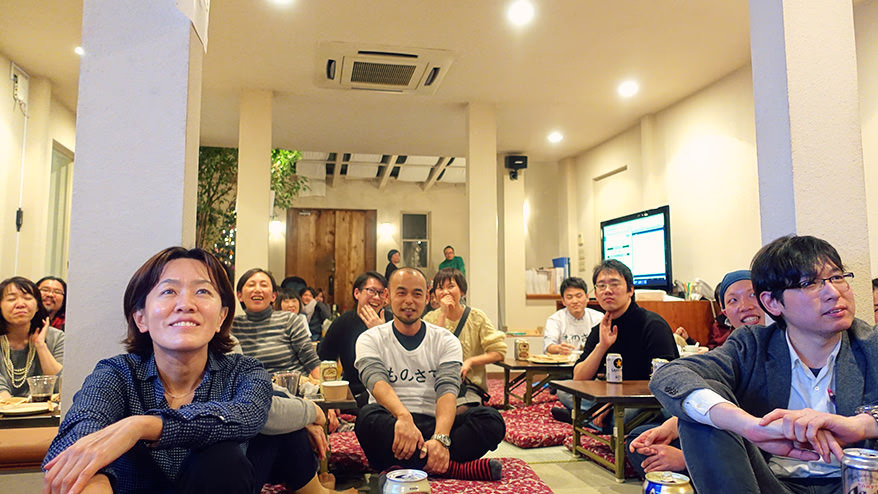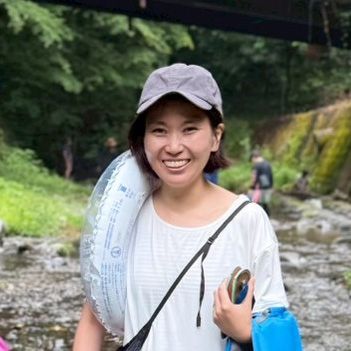2015年12月22日、毎年恒例の納会&忘年会が開催されました。(モノサスは“日本一早い仕事納め”を目指しています。)。今回の忘年会は「おつかれさまを言おう」というシンプルなコンセプト。オフィスに畳を敷きつめて、モノサスらしいほっこりムードの中、楽しいひとときをすごしました。(詳しくはこちらのレポートをご覧ください。)
例年以上に「ものさす式 DIY」がつまっていると感じた今回の忘年会。一体どんな想いから企画されたのか?その裏側に迫るべく、忘年会委員の3名(河原崎・清水・藤原)にインタビューしました。
「みんなでおつかれさまが言いたいんです!」
その想いににたどり着くまで
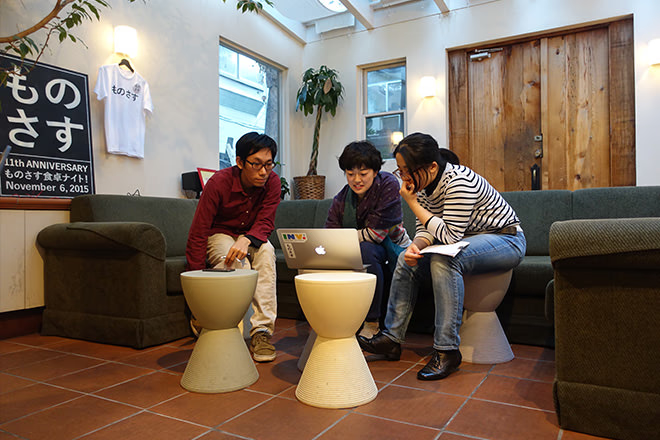
忘年会について打ち合わせする委員3名(左から河原崎、藤原、清水)
ー お座敷会場、オープンマイクと、今年は例年にも増して面白い企画の忘年会でした。あの企画はすぐに浮かんだのですか?
藤原 実は3案目なんです。1案目は、モノサスが仕事で関わった地域のご当地料理をふるまう忘年会案でした。けれどその案は林さん(代表)に一蹴されまして(笑)。
河原崎 その頃はまだ僕ら3人のやりたいことが明確でなかったんです。惨敗でした(笑)。そこで2回目の企画の時はいろいろみんなで話したんですよね。
清水 「何がしたいのか」ということからはじまる枝分かれルート(マインドマップ)を作りました。
河原崎 持ってますよ!
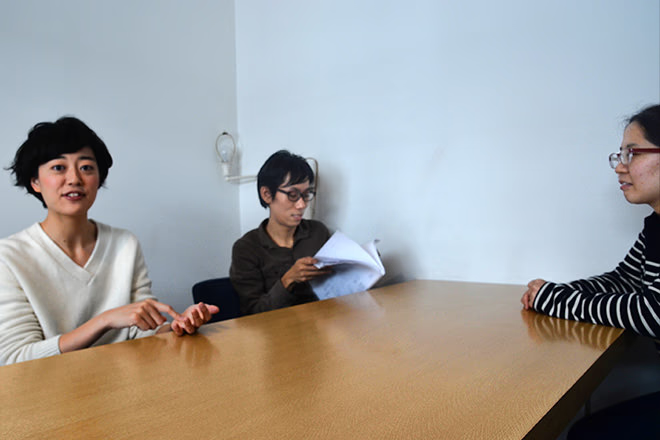
椅子の背中に挟んでいたマインドマップをゴソゴソと取り出す河原崎(真ん中)
ー マインドマップまで作ったら、次の企画はうまくいったのでは?
清水 それが、全然だめでした。全部用意されたもので済まそうとしてしまったという...。
藤原 お金で解決しようとしてしまったんです。DIYとは真逆の提案ですよね。お店を会場にするとか、シェフを呼んできて料理を作ってもらう、みたいな提案をしました。
ー マインドマップで言うと、どのあたりの言葉からその提案が出てきたのですか?
河原崎 これです。
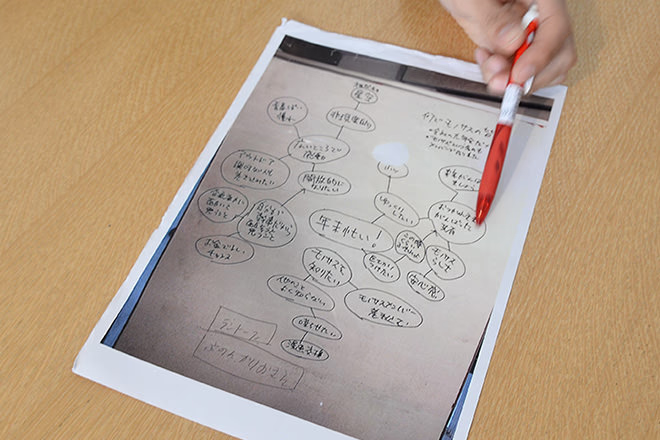
ペンで指すのは「おつかれさま がんばった 共有」という部分
河原崎 「年末だからみんな忙しいよね。忙しいからゆっくりしたいよね。頑張った、おつかれさま」などの言葉からはじまって...。
藤原 幹事もみんなと同じようにゆっくりしたい。
清水 つまり、私たちが「楽(らく)したい」という発想になっちゃったんです。
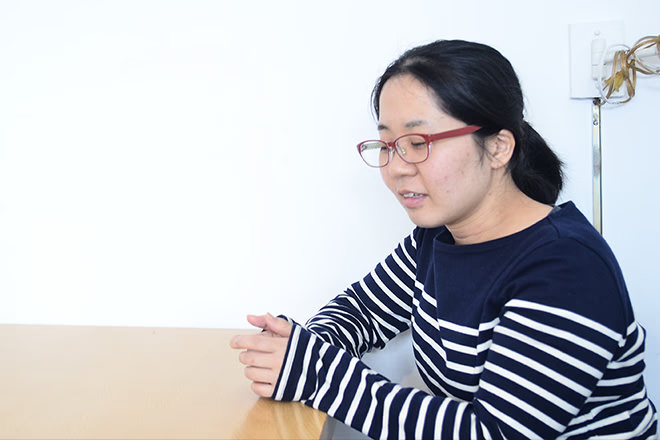
忘年会委員・清水(コーディングファクトリー部 チェックチーム所属)
河原崎 古民家っぽいお店でやろうとしたんですけど、要は居酒屋ですよね。そしたら案の定、「それって普通の忘年会じゃない?」と再び一蹴されました。
ー なるほど。そこで振り出しに戻ってしまったんですね。
河原崎 何をしたいのかいろいろ考えているうちに、煮詰まってきました。とうとう追い詰められた時、ぽろっと口から出てきたのが「みんなでおつかれさまを言いたいんだ」という言葉だったんです。そしたらみんな「それだ!」っていう感じで、コンセプトが決まりました。
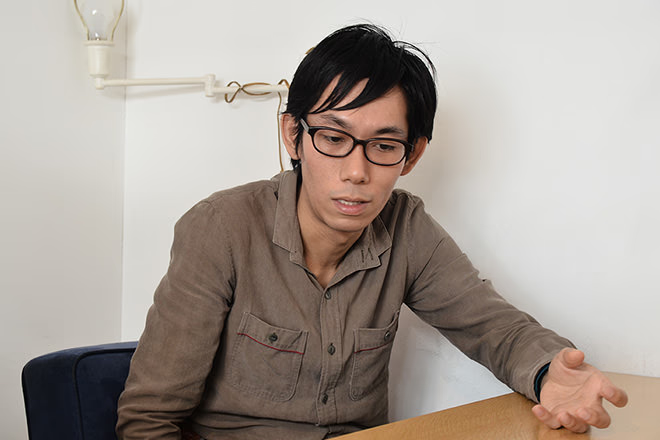
忘年会委員・河原崎(クリエイティブ事業部 デザインチームリーダー)
忘年会のコンセプトに決まったのは「みんなでおつかれさまを言いたいんだ」というシンプルな言葉。けれどもが、一番強く、みんなと共有できる想いとなったのです。
企画の核をみつけた3人。ここからが忘年会委員の腕のみせどころとばかりに、創意工夫にあふれた忘年会を企画していきます。
「おつかれさま」を言い合える
「場」をつくる
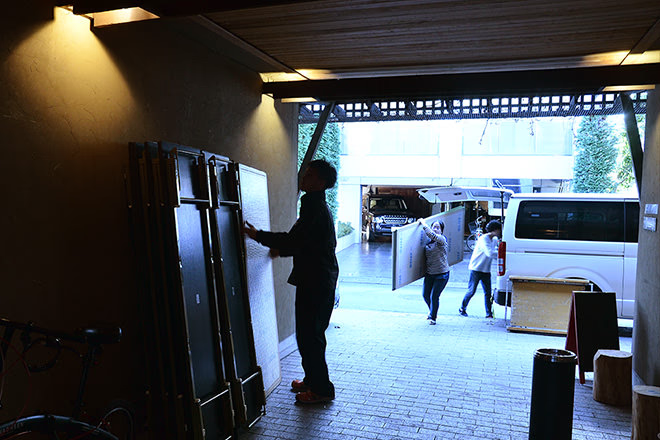
レンタルの畳を搬入する忘年会委員
ー フロアに畳を敷いて「公民館スタイル」なんて呼ばれた会場は、今までにない、新しい設営でしたね。あれはどういう発想から来たんですか?
清水 イメージとしては、温泉宿や旅館の宴会場でした。
藤原 畳は席の境界線がないので、好きなように動けるのがいいなと。机を小分けにして、人と人の距離感を近づきやすくしたのもポイントです。
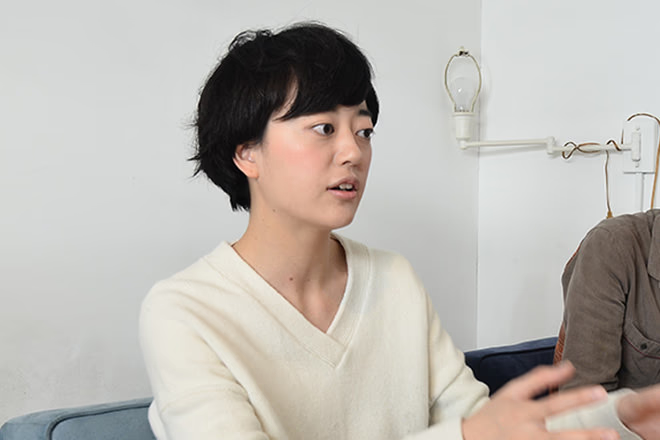
当時、入社2ヶ月目だった忘年会委員・藤原(プロデュース部)
ー 場所は最初からモノサスだったんですか?
河原崎 レンタルスペースも探したんですけど、立地と時間とお金の融通が効くのは、やはりモノサスだということになりました。普段みんなが作業している場所を会場にするので、机や椅子、パソコンをすべて動かさなければなりませんし、設営が大変です。けれど、みんなが想像以上に手伝ってくれました。音響に詳しい人がスピーカーを用意してくれたり、機械が得意な人がモニターをつないでくれたりと、みんなが得意な分野を活かして動いてくれたんです。
ー 料理もケータリングだけでなく、有志のスタッフによる手作りもありましたね。料理をみんなに作ってもらうことにした理由は何だったんですか?
藤原 他のスタッフにも準備段階から関わってもらいたい、という気持ちがあったんです。
河原崎 最初は参加者全員が料理を持ち込む企画を立てていたんです。全員がDIYするっていう意味でよいかなと。
藤原 ただそれだと規模が大きくなりすぎて、収集がつかなくなる心配はありました。
河原崎 だったら、料理を作ってくれる数人の有志にお願いした方が、企画の破綻もないのでは?と。モノサスには元料理人や料理が得意な人がいるので、その人達に聞いてみよう、ということになりました。
それでも本当にうまくいくかどうか、不安で。その事を林さんと話している時に、ちょうど永井さん(副社長)がやってきて、自分の様子をみて心配してくれたのか「じゃあ私も何か作るよ」と名乗り出てくれたんです。その時、この企画を進めても大丈夫だな、と思うことが出来ました。
ー 合いの手があったんですね。
河原崎 そうですね(笑)。他のメンバーも「私、そういうモノサスのイベント、参加してみたかったんですよ!」なんて言いながら喜んで協力してくれたことがすごく嬉しかったです。
ー 日本酒とブランデーで漬けた梅酒も、手づくりだったとか?
河原崎 はい。ものさす梅酒部が、ぜひみんなで飲んでください、と提供してくれたんです。
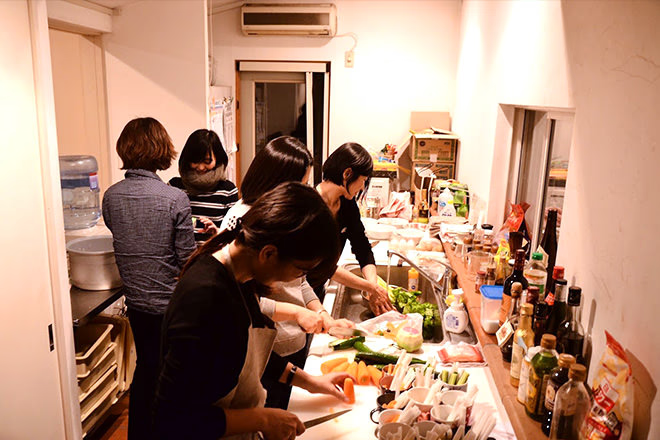
料理の腕をふるうスタッフ。60人前の料理を作ります。
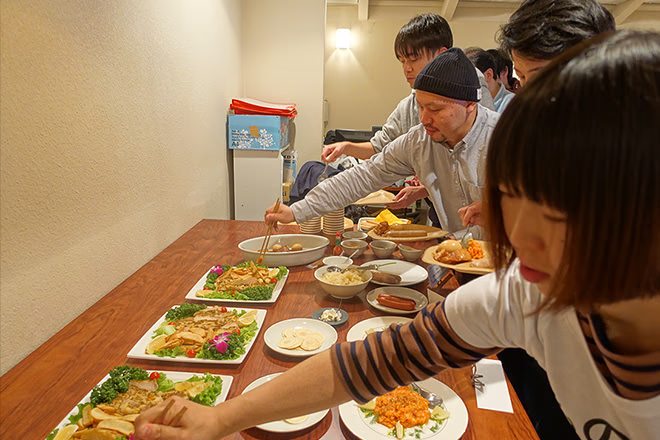
忘年会料理をお皿に盛るメンバーたち
畳と小テーブルが並ぶ、温泉宿のような宴会場は、忘年会委員の狙い通り「ほっ」と一息つける場に。そして自分たちでつくった料理とお酒、会場の設営も、みんなで協力して行う「DIY」な忘年会となりました。
みんなで集めた「おつかれ賃」の
お金の使いみち
ー 今年頑張ったエピソードを添えて自分自身に「おつかれさま」を言うオープンマイクは盛り上がりましたね。あの企画は「みんなでおつかれさまを言いたいんだ」というコンセプトが決まった後、すぐに出てきたアイデアですか?
藤原 はい。自分が担当していた仕事のイベントで、参加者が自由に思いをぶつけるオープンマイクの企画があったんです。それを見ていたので、みんながねぎらい合うイメージがすぐに浮かびました。これならいけると。
ー オープンマイクの登壇者に、自分のおつかれに見合う「おつかれ賃」を払ってもらうくだりが特に面白かったなと思います。また、登壇者以外のみんなからも、参加費として「おつかれ賃」を集めていましたが、それはどうしてですか?
河原崎 例年参加費は集めていなかったので、今年もそうするつもりでした。ただみんなで話し合った時に、無料で提供されるサービスは受ける側も無意識に妥協してしまうので、額は小さくても「お金を払う」方が参加する意識が高まるのでは?という意見があり、確かにそうだと考えました。
ただし、単純にお金を払うだけではおもしろくないので、「自分へのおつかれ」に対して支払う「おつかれ賃」にしてはどうだろう、というアイデアが生まれました。
清水 じゃあ集まったお金はどうする?となった時に、タイムリーにコーヒーメーカーが壊れていて、修理に数万円とかかると聞いたので、だったら「おつかれ賃」で新しいコーヒーメーカーを買おう!と決まったんです。
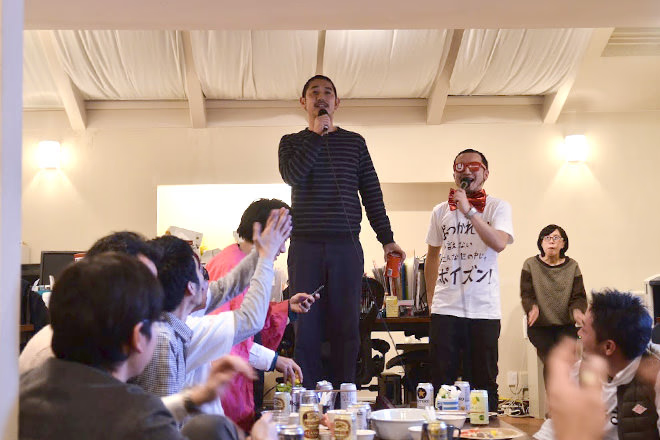
オープンマイクの壇上に立つプロデュース部部長・真鍋。子供達のために貯めていた500円玉貯金箱をまるごと「おつかれ賃」として提供した。
ゲームに参加して特定の誰かが景品をもらうのでなく、みんなで楽しめる「コーヒーメーカー」に還元する「おつかれ賃」のしくみ。これが今回の企画の大きなポイントだったのではないでしょうか。
個人のものが、自分とみんなのもの(=コモン・共)に循環してゆく、そんなしくみが、これまでにないユニークな企画だったと思います。
「自分とみんな」で楽しみたい
コモン(共)につながるしくみづくり
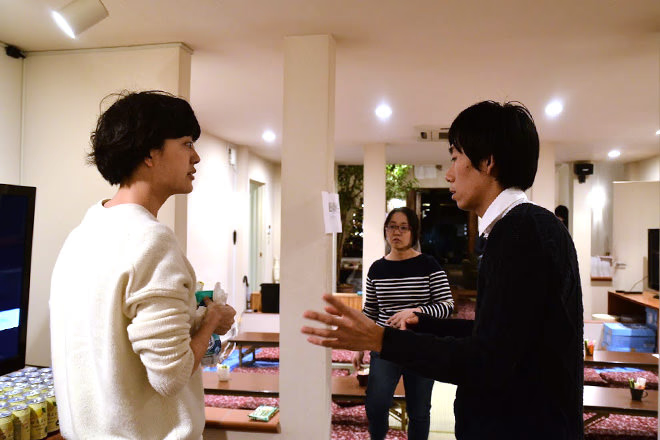
会場設営時に段取りを確認する忘年会委員たち
ー 今回の忘年会委員を通して、気づいたことや思ったことを教えてください。
清水 コンセプトを作るのが一番大変でした。案を出すのって難しいんだなと思い知りましたね。けれど1,2案目ですんなり決まらなくて良かったです。もし決まっていたら、こんな楽しい企画にならなかったと思います。
河原崎 正直な話、今年の忘年会委員は経験値が少ない僕達3人でしたので、不安でした(笑)。今となっては、歩みが同じ3人で、モノサスらしさってなんだろうと考えながら進めたので、逆によかったなと思っています。
そして何よりみんなが協力してくれたことが嬉しかったです。はじめて会社のイベントを企画してみて、何かをする時に人を巻き込むってこういうことなんだ、と分かりました。
藤原 お金の使い方についても考えさせられましたね。最初は予算にとらわれていて、その枠の中でしか物事を考えていませんでした。けれど本当は逆で、やりたいことが先にあって、それを実現にするのに必要なお金はどれくらいなのか、考えなければいけなかったんです。参加費を「おつかれ賃」として集めたり、その使い道を考えることも、今回の企画の大きなポイントだったと思います。
--
予算の枠の中で考えることをやめ、やりたいことをDIYで実現した忘年会委員。彼らの「忘年会を楽しむ」という意味が、「手間をかけずに楽しむ」というものから、「自分たちで考え、工夫することを楽しむ」という意味へ、変化していったのが印象的でした。
また、料理や会場設営など、みんなで工夫する「すき間」をつくることで、「参加してもらうしくみ」を生み出したこと。集めたお金を、みんなに還元できるもの(コーヒーメーカー)に使うというしくみを考えたこと。個人の楽しみが、めぐりめぐって自分とみんなの楽しみ(=コモン・共)に循環してゆく、そんな「ものさす式 DIY」がつまった忘年会が実現できたように思います。
悪戦苦闘しながらも、心に残る忘年会を企画してくれた委員。そんなみんなに、あらためて「おつかれさまを言いたい」です。
